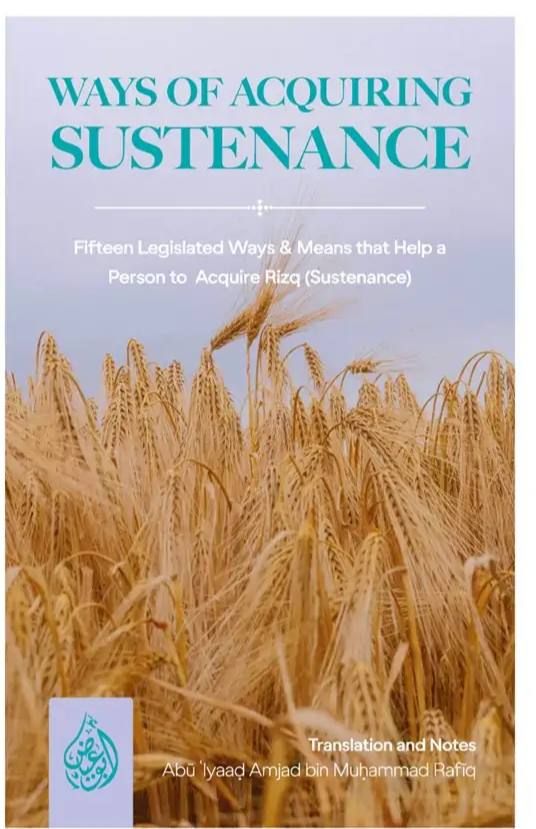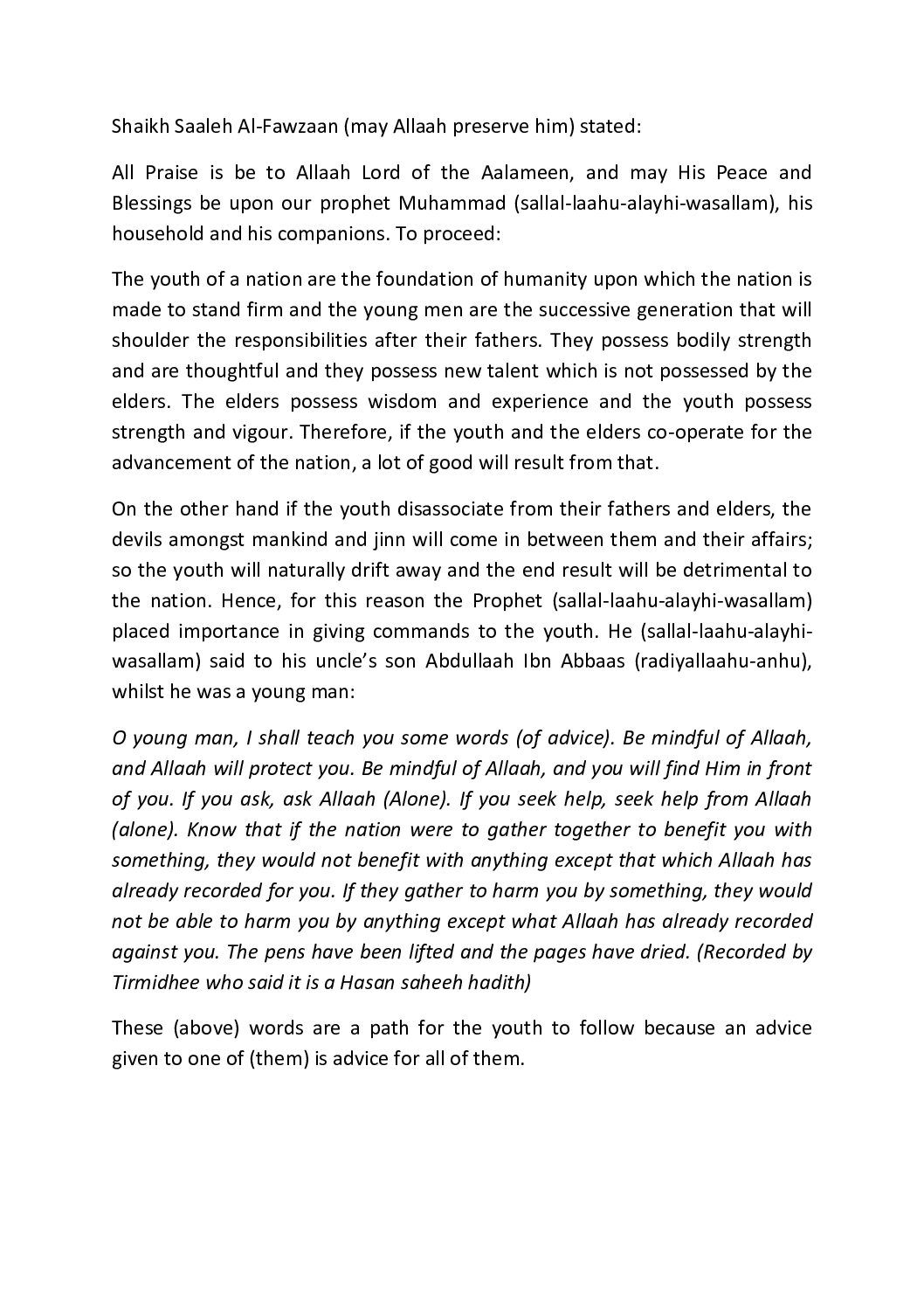Tag: scholars
Arabic Risaalah on Al-Qawaa’id Al-Fiqhiyyah- by Sh Muhammad Baazmool
Written by Salafi Dawah Manchester on . Posted in Islamic Jurisprudence - 'Fiqh', Scholars of Islam, Seeking Knowledge, Worship - 'Ibaadah'.
Short Commentary on Three Treatises by Imaam Abdul Azeez Bin Baaz (rahimahullaah)
Written by Salafi Dawah Manchester on . Posted in Aqeedah (Creed & Belief), Monotheism - Tawheed, Purification of The Soul, Scholars of Islam, Worship - 'Ibaadah'.
A Valuable Book –InShaaAllaah- to Have if We Are Able
Written by Salafi Dawah Manchester on . Posted in Articles, Salaah - Prayer, Scholars of Islam, Seeking Knowledge, Worship - 'Ibaadah'.
Notification to the One Who Was Searching For an Explanation of ‘Manhajus Saalikeen’ In This Website
Written by Salafi Dawah Manchester on . Posted in Scholars of Islam, Seeking Knowledge, Worship - 'Ibaadah'.
Assalaamu alaykum Warahmatullaah;
In the search section (in this website), we came across a search for Sharh of Manhajus Saalikeen. Here is a link https://archive.org/details/Bazmol_Moh with few audios (Explanation of Manhajus Saalikeen) by Shaikh Muhammad Baazmool (may Allaah preserve him). See audio numbers 85, 86, 87 and 88. Hope this would be helpful. May Allaah grant us and you beneficial knowledge, and righteous deeds.. Aameen.
A Reminder to Those Who Adopt This Particular Path of Ihyaa Turaath’s Mentor, In Order To Harm SP and Other Salafiyyoon In The West!
Written by Salafi Dawah Manchester on . Posted in Deviated Groups, Sects and Parties, Methodology - 'Manhaj', Must Read, Refutations, Scholars of Islam, Tamyee'.
In The Name of Allaah, The Most Merciful, The Bestower of Mercy
Shaikh Rabee (may Allaah preserve him) stated:
Indeed, from the most severe of afflictions and trials upon Islaam and the Muslims in this era, is the appearance of a group claiming to be upon the methodology of Ahlus Sunnah Wal-Jamaa-ah, but unfortunately this group does not act except in opposition to this manhaj and its people; openly at times and behind veils at other times.
And indeed this group has placed a heavy burden upon its shoulders, and that is its defence of the people of innovation and misguidance. They author books in this regard and decorate statements for it; and they spread such defence in the world under the slogan of justice and equity or the manhaj of Muwaazanaat. They exceed the limits in the affair of Fiqul Waaqi (knowledge of current affairs) and speak ill of the scholars of the salafi methodology as a result of that; rather they degrade the methodology of the scholars as a
result of this and increase in ill speech against the salafi methodology and its people. The effects of the path of justice and equity are neither seen in their arguments against the people of the Salafi methodology nor in their praises and exaltations for the people of innovation.
Alongside concealing themselves with the Salafi Methodology, they are not seen to give it importance except with respect to what they utilize to deceive those deceived by them, or (what they utilize as) garments of salafiyyah in order to bring the people to their corrupt hizbi organization to kill off their love for the Salafi Methodology, the call to it, defence of it, traversing in it upon the methodology of the pious predecessors with the (correct) walaa wal baraa and being warned against the people of innovation; so they divert a great deal of people from the true methodology and the truthful alliance for it; and (direct them) towards that passionate alliance to the people of innovation and in defence of them, their innovations and falsehoods; or playing down their innovations to the extent that it leads them to the station of the extreme murji’ah with regards to their views towards the major innovations and greats affairs of opposition to the true religion of Allaah.
And due to this, hatred has occurred from them towards the carriers of the Sunnah and the salafi methodology; and they set up those who present their mistakes which have neither been criticized by a sunni nor a bid’ee from amongst those who ascribe themselves to Islaam. They present these mistakes as mighty affairs of blunder and destruction, rather they make the virtues and merits of ahlus sunnah to be repugnant and disdainful in addition to much fabrication and accusation.
So with these disgraceful deeds they perpetrate, they are from the severest in war against the salafi methodology and its people; the severest in their opposition to the salafi methodology and its people; the most intense in their defence of the groups of innovation and fitan, their claims and methodologies. They have authorships in this regard and from them: The many authorships of Shaikh Abdur-Rahmaan Abdul Khaaliq who carries the responsibility of this destructive orientation. [Source: Bayaanu Fasaadul Mi’yaar; Hiwaar Ma-a Hizbi Mutasattir; page:5-6. Slightly paraphrased]
Fajr Is Still Very Early! -[Fiqh Derived From a Hadeeth About Using An (Alarm) Clock to Help Us Wake Up etc]
Written by Salafi Dawah Manchester on . Posted in Islamic Jurisprudence - 'Fiqh', Scholars of Islam, Worship - 'Ibaadah'.
It is reported in a hadeeth in Muwatta Imaam Maalik that the Messenger (sallal laahu alayhi wasallam) travelled by night on the way back from khaybar and towards the end of the night he stopped for a rest and said to Bilaal (radiyallaahu-anhu), “(Stay awake) to watch out for the morning (prayer) for us…..’’ [Ref 1]
Shaikh Muhammad Baazmool (may Allaah preserve him) said, “What is the evidence behind the permissibility for a person -before he (or she) sleeps- to watch out for the time by way of (an alarm) clock in order to be notified of (the time of the Salaah)? The evidence is that the Messenger (sallal-laahu-alayhi-wasallam) sought from Bilaal (radiyallaahu-anhu) to guard the time for them, saying,”(Stay awake) to watch out for the morning (prayer) for us”. [Ref 2]
[Ref 1: See complete hadeeth in ‘Muwatta Imaam Maalik- Hadeeth Number 25 under section (The Times of Prayer)]
[Ref 2: Sharh Woqootis Salaah Min Muwatta Al-Imaam Maalik Bin Anas’ page 111. Publisher: Daarul Istiqaamah. 1st Ed. 1429 (Year 2008). Abridged and paraphrased]
Two New Arabic Titles At Salafi Bookstore [Salafipublications (Birmingham)]
Written by Salafi Dawah Manchester on . Posted in Articles, Salafi Masjid Birmingham, Scholars of Islam, Seeking Knowledge.
The Excellence of The Ten Companions Given Glad Tidings of Paradise
Written by Salafi Dawah Manchester on . Posted in Scholars of Islam, The Salaf - Pious Predecessors.
Shaykh Rabee – May Allaah preserve him – said:
The Messenger of Allaah ﷺ singled out the ten to be the most virtuous of the companions (May Allaah be pleased with them): “Abu Bakr is in Jannah, and Umar is in Jannah, and ‘Uthman is in Jannah, and Ali is in Jannah, and Talhah is in Jannah, and Az-Zubayr is n Jannah, and Abdur-Rahmaan ibn ‘Awf is in Jannah, and Sa’d Ibn Abee Waqqaas is in Jannah, and Sa’eed Ibn Zayd ibn ‘Umayr ibn Nufayl is in Jannah and Abu Ubaidah ibn Al-Jarrah is in Jannah.(Ref: 1)
Then these ten are those famous in the Ummah due to it being known that they have been granted entrance into paradise. The Messenger of Allaah ﷺ bore witness to that for them and this virtue is one that is specific to the Ten (May Allaah be pleased with them).
[SOURCE: AN EXCERPT FROM AL-WASAAYAA AL-MANHAJIYYAH LI MUTTABI’I AHLUS-SUNNAH AN-NABAWIYYAH PG.223. slightly paraphrased]
Ref 1: Reported by Imaam Ahmad (rahimahullaah) his Musnad (1/194) and At-Tirmidhee in Al-Manaaqib Al-Hadeeth (no.3747).
Arabic: A Treatise on the Subject Matter of the Times of the Prayer –By Shaikh Muhammad Baazmool
Written by Salafi Dawah Manchester on . Posted in Islamic Jurisprudence - 'Fiqh', Salaah - Prayer, Scholars of Islam, Seeking Knowledge, Worship - 'Ibaadah'.
Shaikh Muhammad Baazmool (may Allaah preserve him) gives a brief explanation on ahaadeeth found in Muwatta Imaam Maalik on the subject matter of the times of the prayer and other affairs related to them. So get a copy and benefit from it if you have the ability alongside your regular attendance at the Duroos in the Salafi Masaajid and Centres. The Imaams and Mu’addhins in particular will find a lot of fawaa’id in this Treatise – either as a reminder or something new to learn InShaaAllaah. May Allaah grant us fiqh in the Religion Aameen.
Publisher: Daarul Istiqaamah
1st ed 1429AH (Year 2008)




















